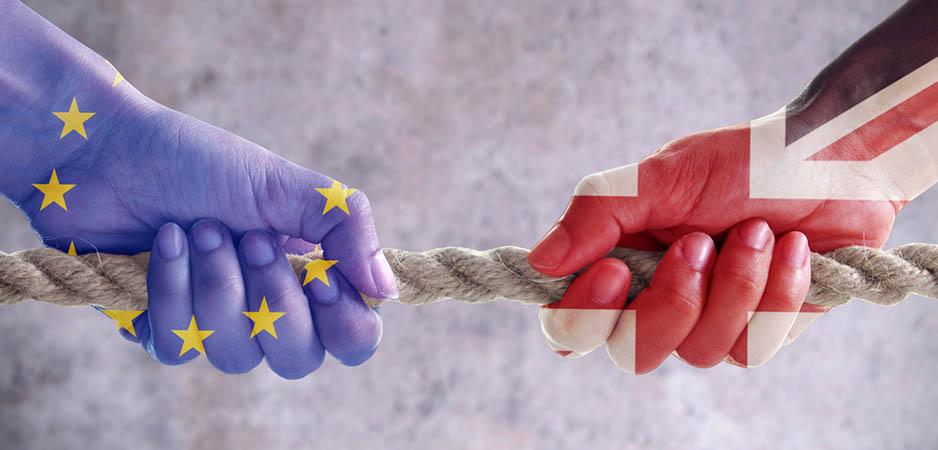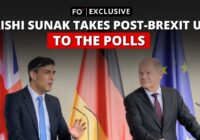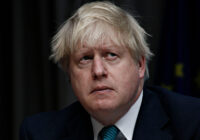As the plot continues to thicken with no denouement in sight, Brexit is keeping the entire world on tenterhooks. The Daily Devil’s Dictionary explains.
Like the classic silent film serial Perils of Pauline, Brexit has turned into a never-ending series of cliff-hanging news cycle episodes authored and produced by the British Parliament. It might be called the “Trials of Theresa” or even the “Traumas of Theresa,” as its heroine keeps fending off fatality, weathering storms and escaping the various villainies increasingly initiated by her own party.
Andrew Bridgen, a Conservative Brexiteer who opposes Prime Minister Theresa May’s Brexit deal, is concerned that the purity of Brexit may be violated. He wants to join other members of his party clamoring for a vote of no confidence to prevent May from reaching a compromise deal with Labour Party leader Jeremy Corbyn that might include something other than total liberation. They are afraid that the new deal cooked up by the two conspirators, once submitted to the European Council, would be accepted, providing a final episode with the wrong ending to a melodrama that has provided spectators with endless thrills.
Because May survived a vote of no-confidence in December 2018, parliamentary rules state that the prime minister will retain the confidence of her party for a minimum of 12 months. In other words, the Tories would have to wait till December to push her out the door, whereas they need to scotch her deal with Corbyn before this Wednesday evening.
Bridgen realized that the only means of making his point would be an “indicative vote” in place of the now forbidden formal vote of non-confidence. He succinctly stated his reasoning: “It seems to be all the rage, so why not?”
Here is today’s 3D definition:
All the rage:
An idiom referring to what people — including politicians — should do just because other people are doing it, even if the outcome it will produce implies undermining the economy of one’s nation
Contextual note
The remaining choices concerning Brexit seem to focus on the question: What do you want to see split? Apart from a possible majority that is so fed up with the hesitations, obstacles, contradictory suggestions and refusals of accountability it would vote for “remain” in a second referendum, everyone else is weighing what they want to see split, if not shivered into tiny slivers.
The Tory Brexiteers just want to see the split with Europe so they can then focus on how to reorganize their power to run the show without external interference. They see this as the only way of avoiding seeing their own party — and the key to their ability to exercise power — being split down the middle. They don’t mind seeing the island of Ireland physically split into two, even if it sparks a renewal of “the Troubles,” mainly because they have never had any interest in the Irish, north or south.
May and whoever in her party who is still willing to follow her lead wants to split from Europe but with numerous strings attached, and she doesn’t seem to mind the fact that that would split her party. Perhaps she has had enough of exercising power and now sees it a losing proposition all the way around.
Historical note
This is not the first time a monumental historical decision has been suggested because it was “all the rage.” But in fairness to Bridgen, his remark was both ironic and pertinent, as it recognized and even highlighted the melodramatic futility of the exercise of an “indicative vote.” One of the most obvious cases was the obsession of European nations preceding World War I to build up their armed forces. They thought they were merely competing for prestige and recognition. As the website The World at War describes it: “[E]ach country wanted to be ‘better’ than the others. The terms of power during this time began transitioning from having more land to having better means of fighting.” They didn’t intend to fight, but they created so much capability that a local incident in Sarajevo set off a continental conflagration.
But the clearest historical parallel with Brexit, with far-reaching consequences, occurred in the early 16th century when Henry VIII decided he needed to change wives and ended up having to change religions, or at least supplant the pope, to achieve his goal. It happened to coincide with the Protestant revolt in northern Europe, which the English may have perceived at the time as “all the rage” on the continent. Henry VIII himself remained in the theological camp of the Catholic Church but, possibly inspired by the example of some of the princes in Martin Luther’s Germany, declared his independence. History Today recounts: “The easiest explanation is that Protestantism was the fashion of the time and that England was catching up on the latest developments.”
Luther’s early success with Prince Philip of Hesse and Philip’s initiative in creating the Schmalkaldic League of Protestant princes may have convinced Henry VIII that it would be politically safe to break away from Rome, even if he didn’t consider himself a reformer.
 The result proved disastrous for both English society and Europe, as the wars of religion lasted for 130 years, the final Europe-wide episode being the Thirty Years’ War that was finally resolved by the Treaty of Westphalia in 1648. During that period, persecution and wholesale massacres occurred on both the Protestant side under Henry’s resolutely Protestant son, Edward VI (1537-53), and his daughter, the Catholic Mary (1553-58), who was also the wife of Spain’s Philip II.
The result proved disastrous for both English society and Europe, as the wars of religion lasted for 130 years, the final Europe-wide episode being the Thirty Years’ War that was finally resolved by the Treaty of Westphalia in 1648. During that period, persecution and wholesale massacres occurred on both the Protestant side under Henry’s resolutely Protestant son, Edward VI (1537-53), and his daughter, the Catholic Mary (1553-58), who was also the wife of Spain’s Philip II.
Elizabethan England (1558-1603), thought of even today as a Golden Age, became permanently divided into principally three religious groups: Anglicans, anyone who accepted the authority of the national church; Puritans, a diverse group of fundamentalists — indeed the ancestors of the Christian fundamentalism that has played such a strong role in politics in the US to this day; and Catholics, who were banned from religious practice and systematically persecuted (a group that included cultural luminaries such as Shakespeare, William Byrd and Thomas Campion). This created three largely incompatible cultures that required the creation of a brutal surveillance state overseen by Sir Francis Walsingham to maintain at least superficial order.
The tension between these communities eventually led to the internecine conflict known as the English Civil War, the beheading of King Charles I in 1649 and a decade of Puritan “Commonwealth” under Oliver Cromwell. It ended with the Restoration of the Stuart monarchy in 1660, a process that led to the establishment of two major trends that defined the future of the nation. It reinserted England into the new nation-state logic of post-Westphalian Europe, and it triggered Britain’s voracious quest for empire.
It took more than a century for England to achieve some kind of internal peace after Henry VIII’s Brexit. This doesn’t bode very well for the UK’s immediate future today.
*[In the age of Oscar Wilde and Mark Twain, another American wit, the journalist Ambrose Bierce, produced a series of satirical definitions of commonly used terms, throwing light on their hidden meanings in real discourse. Bierce eventually collected and published them as a book, The Devil’s Dictionary, in 1911. We have shamelessly appropriated his title in the interest of continuing his wholesome pedagogical effort to enlighten generations of readers of the news.]
The views expressed in this article are the author’s own and do not necessarily reflect Fair Observer’s editorial policy.
Support Fair Observer
We rely on your support for our independence, diversity and quality.
For more than 10 years, Fair Observer has been free, fair and independent. No billionaire owns us, no advertisers control us. We are a reader-supported nonprofit. Unlike many other publications, we keep our content free for readers regardless of where they live or whether they can afford to pay. We have no paywalls and no ads.
In the post-truth era of fake news, echo chambers and filter bubbles, we publish a plurality of perspectives from around the world. Anyone can publish with us, but everyone goes through a rigorous editorial process. So, you get fact-checked, well-reasoned content instead of noise.
We publish 2,500+ voices from 90+ countries. We also conduct education and training programs
on subjects ranging from digital media and journalism to writing and critical thinking. This
doesn’t come cheap. Servers, editors, trainers and web developers cost
money.
Please consider supporting us on a regular basis as a recurring donor or a
sustaining member.
Will you support FO’s journalism?
We rely on your support for our independence, diversity and quality.






